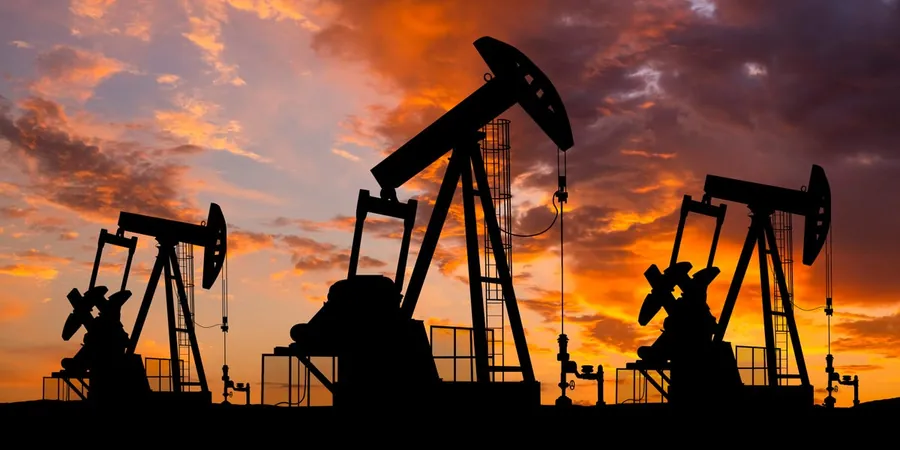
Trump's Oil Boom Promise Faces Reality Check from ExxonMobil CEO
2024-11-12
Author: Jia
Introduction
In a bold proclamation, former President Donald Trump has pledged to lower gas prices by ramping up oil production in the United States. However, this ambitious vision appears to be at odds with the current realities of the global oil market, as highlighted by ExxonMobil's CEO, Darren Woods.
Skepticism from ExxonMobil
In a recent interview with Semafor, Woods expressed skepticism about the immediate prospects for a US oil boom. He pointed out that while maintaining high production levels is necessary, the market is already saturated. "I don't think today that production in the US is constrained," Woods stated. He further noted, "I don't know that there's an opportunity to unleash a lot of production in the near term."
Trump's Campaign Promises
Trump's campaign promises included a commitment to significantly reduce energy prices within a year, famously declaring, "We will frack, frack, frack and drill, baby, drill." He also set an ambitious goal of lowering gas prices to below $2 a gallon. Yet, the reality speaks differently; energy analysts suggest that the large oil companies prioritize shareholder returns over new investments aimed at increasing production.
The Reality of US Oil Production
Ben Cahill, director of energy markets and policy at the University of Texas at Austin, emphasized the limited power any president has over the volatile oil market. "It's a global market," Cahill noted, reiterating that substantial changes to oil or gasoline prices are unlikely to come from executive actions.
Despite Trump's assurances, the US is already producing substantial amounts of oil. Recent statistics show that in 2023, the US extracted 12.9 million barrels of crude oil per day, a notable increase from 11 million barrels per day in 2020. By 2025, projections indicate that production may rise to an unprecedented 13.5 million barrels per day.
Potential Growth Opportunities
There are potential growth opportunities, particularly in regions like the Gulf of Mexico, where federal restrictions have prevented drilling. Woods mentioned that these areas could serve as key sources for future production increases.
Challenges in Production and Price Stability
Experts assert that while Trump might implement measures to encourage oil production, such as relaxing regulatory constraints and influencing OPEC dynamics, achieving a balance between production and price stability remains challenging. Patrick De Haan from GasBuddy warned that fluctuating oil prices could naturally lead to production declines in the long term, as companies face pressure from shareholders.
Contrasting Administrations
Interestingly, even as Trump emphasized drilling during his presidency, the US managed to boost oil production amid stricter regulations under current President Joe Biden aimed at curbing greenhouse gas emissions and addressing climate change.
In a related dialogue, Woods also conveyed his stance on climate initiatives, supporting Biden's restrictions on methane emissions, a significant factor in the oil and gas sector's environmental impact. This marks a striking contrast to Trump's administration, which withdrew from the Paris Agreement. Woods argued against pulling out, citing the need for collective global action to transition away from fossil fuels and amplify renewable energy efforts by 2030.
Conclusion
While Trump's promises of an oil boom resonate with his base, the complexities of global oil dynamics and environmental accountability present significant hurdles to realizing such ambitious goals. Will the next administration be able to navigate these challenges, or will they face a stark economic and environmental reckoning? Only time will tell.




 Brasil (PT)
Brasil (PT)
 Canada (EN)
Canada (EN)
 Chile (ES)
Chile (ES)
 España (ES)
España (ES)
 France (FR)
France (FR)
 Hong Kong (EN)
Hong Kong (EN)
 Italia (IT)
Italia (IT)
 日本 (JA)
日本 (JA)
 Magyarország (HU)
Magyarország (HU)
 Norge (NO)
Norge (NO)
 Polska (PL)
Polska (PL)
 Schweiz (DE)
Schweiz (DE)
 Singapore (EN)
Singapore (EN)
 Sverige (SV)
Sverige (SV)
 Suomi (FI)
Suomi (FI)
 Türkiye (TR)
Türkiye (TR)